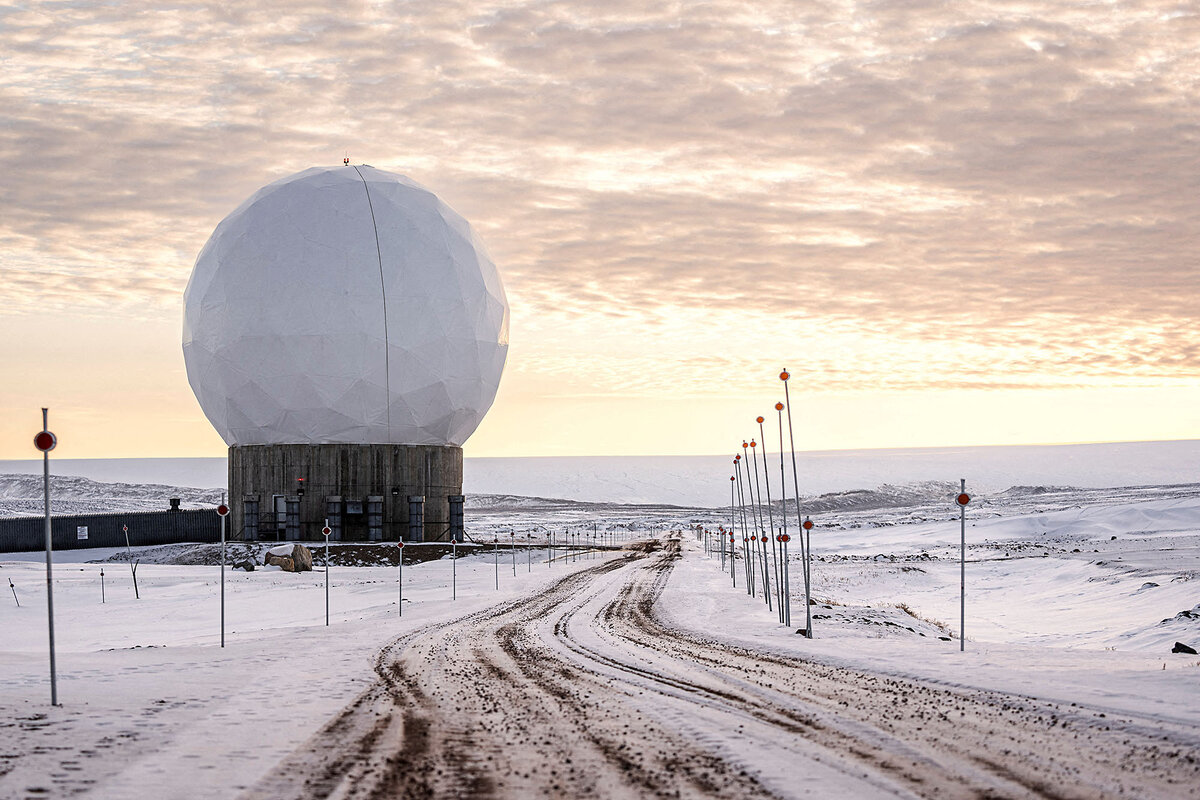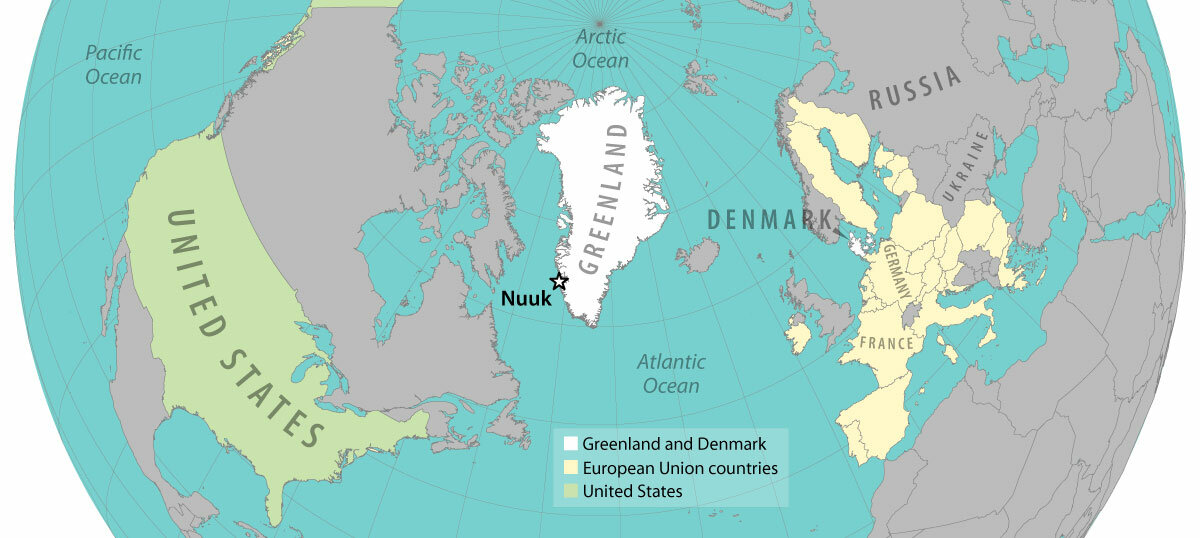When Trump hints at Greenland military action, Europe can’t ignore it. Here’s why.
Loading...
| Basel, Switzerland; and Brussels
When President-elect Donald Trump said last week that the United States needs Greenland “for national security” and refused to rule out military measures to get it, it raised eyebrows all over the world.
Mr. Trump’s fellow Republicans quickly defended his comments. “The United States is not going to invade another country,” said Sen. James Lankford on “Meet the Press” Sunday. “The president speaks very boldly on a lot of things. We’ve seen this [is] how he’s done negotiations.”
But officials in Denmark – and Europe more broadly – don’t have the luxury of thinking that way.
Why We Wrote This
A story focused onDonald Trump’s desire to acquire Greenland – and his implication that he could use the military to get it – may be just a negotiation ploy. But for Denmark and Europe, it would be irresponsible to ignore the possibility that he’s serious.
For while the idea of the U.S. forcibly seizing control of Greenland may appear capricious, the possibility – however remote – raises challenges to international law, security alliances, and U.S.-European relations. France and Germany have responded with a seriousness typically reserved for Russia and China, emphasizing the importance of maintaining Europe’s borders as inviolable.
And even if Mr. Trump intends his Greenland gambit as a ploy to negotiate greater defense contributions from NATO allies, to Europeans his aggressive approach is not how allies should engage.
“The Europeans are taking it seriously,” says Célia Belin, head of the European Council on Foreign Relations’ office in Paris. “It is not just about Greenland. It is about the type of relationship that this president is trying to establish with Europe, which is not just transactional, but extortionist.”
A valuable but independent land
Mr. Trump already expressed interest in buying Greenland, an autonomous territory of Denmark, during his first term.
The island’s appeal to the U.S. is its strategic location and resources. Positioned on the shortest route from North America to Europe, it is pivotal for U.S. military operations, especially in monitoring Russian naval activities and potential missile launches.
Greenland also boasts vast mineral deposits like lithium and rare earth elements, essential for advanced technologies and strategically valued by both the European Commission and Washington. The U.S. Geological Survey estimates 17.5 billion barrels of untapped oil and 148 trillion cubic feet of natural gas off its shores.
Greenland Prime Minister Múte Egede indicated Monday that his government is willing to bolster defense and mining ties with the U.S., but on its own terms. “Greenland’s independence is Greenland’s business, also in relation to the use of its land, so it is also Greenland that will decide what agreement we should come to,” he said at a press conference in Nuuk, Greenland’s capital.
The U.S. has a long-standing military presence in Greenland, notably the Pituffik Space Base. “What is even more unsettling is that this was a very cooperative relationship [between the U.S. and Greenland],” notes Dr. Belin. “There is no need to take over that region and put the stamp of the U.S. on it.”
Mr. Trump’s expansionist rhetoric is forcing Europeans to have conversations that were not even on the agenda. If backed with action, it potentially puts the U.S. on par with revanchist powers China and Russia. Dr. Belin says she is troubled by the focus on allies’ territories, as Mr. Trump has made similar remarks about Canada and Panama.
Stretching Europe’s resources
For now, Europe is in wait-and-see mode.
Denmark, which signed a defense cooperation agreement with the U.S. in 2023, has led the response and urged European nations not to overreact. It has stressed that it is for Greenland, governed as an autonomous territory, to decide its own fate.
French and German top officials warned against any attempt to change the “sovereign borders” of Europe by force. Italian Prime Minister Georgia Meloni, the sole European leader to have visited Mr. Trump at Mar-a-Lago, says she interpreted his remarks as primarily a message to Beijing. China has declared itself a “near-Arctic state” and is building new icebreaker ships with an eye on increasing its presence in the region, according to a NATO report.
Still, the bloc is struggling to present a unified front. “There is a disagreement at the top leadership in Europe,” says Dr. Belin. “Either you make this a moment to establish a balance of power, or you want to avoid the obstacle and talk about everything else the EU needs to talk about with the U.S., including trade, tariffs, Russia, and Ukraine.”
Beatrice Gorawantschy, director of the Brussels office of the Konrad Adenauer Foundation, a conservative think tank, says the European Union is more concerned about sustained U.S. military support to Ukraine than it is about questions on the sovereignty of Greenland, which is not formally part of the EU.
Many EU countries depleted large parts of their already-limited peacetime arms stockpiles to support Ukraine, arguing that they are not facing imminent threats themselves, she notes. The EU would stand no chance in any scenario where the EU needs to confront both Russia and the U.S.
“Supporting Greenland requires naval and air warfare capabilities over long distances and in an Arctic environment,” Dr. Gorawantschy says. “Only a few European countries with strong navies and air forces, including aircraft carriers, would be able to militarily intervene. ... Nuuk is over 3,500 kilometers away from Paris, Brussels, and Berlin.”
NATO keeping cool
But an attack on Greenland would compel other NATO allies to come to its defense. In a hypothetical military dustup between the two members of NATO, Denmark could invoke the alliance’s sacred mutual-defense clause against the U.S. Article 5 states that an attack on one is an attack on all.
So far, NATO officials dismiss the rhetoric as a bluff. “We’ve got enough other things that we’re focused on,” says one senior NATO official.
When it comes to Denmark, Mr. Trump’s refusal to rule out the use of military force regarding Greenland may be another example of his tendency to speak in abrasive ways to Europe about its need to do more, such as increasing defense spending, says Ian Lesser, a close NATO watcher who leads the Brussels office of the German Marshall Fund of the United States. The chances of “an actual military confrontation over Greenland are essentially nil,” he adds.
During his first term in office, Mr. Trump pushed NATO members to increase their spending to 2% of gross domestic product on defense, a goal that NATO estimates 23 of its 32 members should meet by 2025. How much of these increases are thanks to Mr. Trump’s threats versus Russian aggression and Chinese competition is hotly debated. Now the president-elect is pressing NATO members to contribute 5% of their GDP to the alliance.








